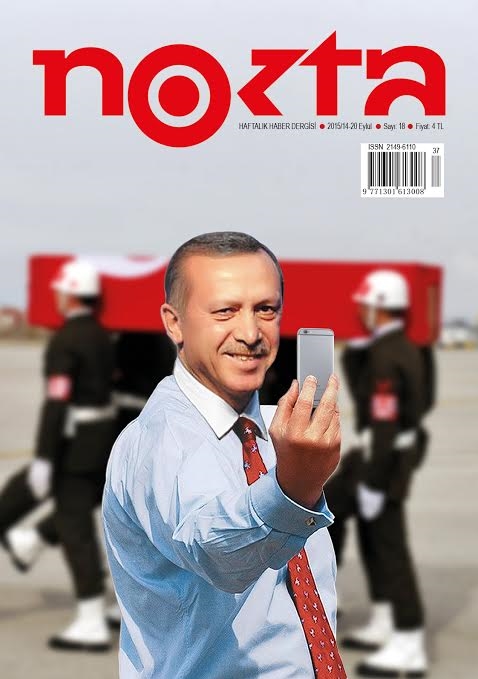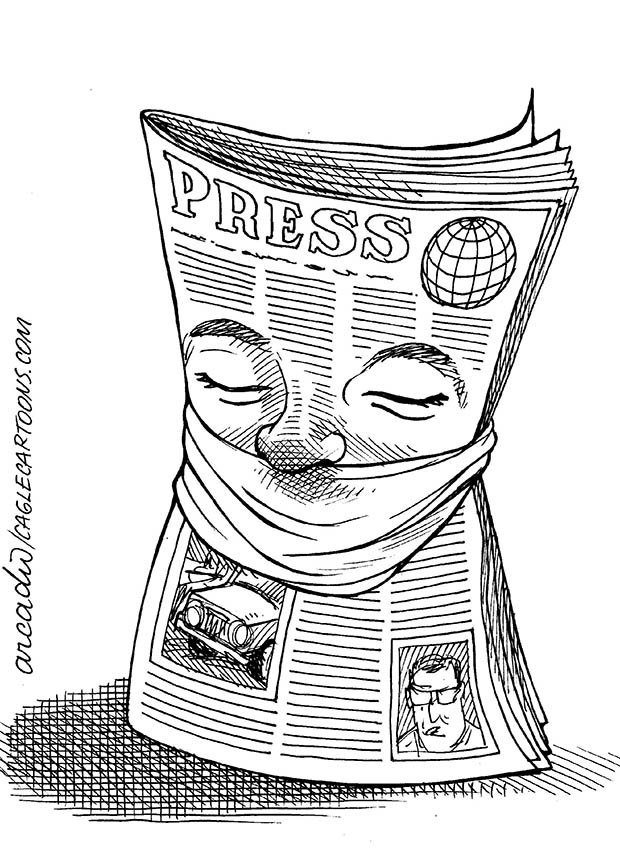23 Jul 2016 | Academic Freedom, Campaigns -- Featured, Europe and Central Asia, Mapping Media Freedom, mobile, News, Turkey, Turkey Uncensored
 It was at the early hours of Friday that a journalist sent a note to her colleagues.
It was at the early hours of Friday that a journalist sent a note to her colleagues.
“We are told by the management that our publication is discontinued with immediate effect,” she said. “We are told to pack our belongings and leave the office. You can’t imagine how sad I am.”
The weekly news magazine Nokta, which had been launched in the aftermath of a military coup in 1980s, is no more.
Lately, under a new management, Nokta belonged to the critical mass of what remained of independent journalism in Turkey, with long reads and popular, bright commentators such as Perihan Mağden and Gükhan Özgün.
My colleague went on to say that the management internal communique cited the loss of a printing house as the reason for the closure. Given the waves of restriction over basic freedoms in the wake of Emergency Rule declared in 81 provinces of Turkey, this explanation came as no surprise.
Commenting on the closure, a Kurdish colleague who has extensively covered the operations in Cizre and Diyarbakır, added: “It’s a disaster to have the media outlets shut down, but it’s even worse to see media professionals left without a job.”
In another incident, Paolo Brera, a well-known reporter with La Repubblica, was held by the police officers at Sultanahmet Square yesterday while interviewing tourists, and taken to police headquarters. At first his whereabouts were unknown, and Italy had to intervene at the highest level to have him released after four hours.
As of Friday afternoon the situation of the columnist and human rights lawyer Orhan Kemal Cengiz was unclear. Cengiz is an international figure and close friend of the Kurdish lawyer Tahir Elçi who was assassinated in Diyarbakır last summer. Among other assignments, Cengiz followed the case of Christian missionaries slain in Malatya in 2007. He attended the UN’s Human Rights Summit in Geneva some months ago, commemorating by explaining the situation to a larger audience. His colleagues are on standby, knowing that he is held at the Anti-Terror Unit in Istanbul. His wife, also a lawyer, had been told that the detention was related to a case from 2014, but nobody has any further details.
The Emergency Rule means that no lawyers other than those appointed by the bar associations are now allowed to have access to all the cases. What is also known is that those who are arrested are held in cells at police headquarters.
Justice Minister Bekir Bozdağ said in an interview yesterday that in “crimes related to terrorist activities” individuals can be detained for at least seven-to-eight days. “Our staff is working on the possibilities of even extending that time,” he said, adding that he shares the concern that it will be very difficult to distinguish innocents from criminals.
The overall situation continues to be opaque, with scarce information, and experienced journalists caution each other to compare what’s being officially stated with what’s really being done. The measures so far leave little doubt that the media and the academia are under severe pressure, and the growing concern is there is an escalation of a clampdown, without much explanation of what the media and academic freedom had to do with the very coup attempt itself.
A version of this article was originally posted to Suddeutsche Zeitung. It is published here with permission of the author.

Turkey Uncensored is an Index on Censorship project to publish a series of articles from censored Turkish writers, artists and translators.
31 May 2016 | Events, Middle East and North Africa

The New Arab news network invites you to a panel discussion to discuss the challenges faced by the media and journalists in the post-Arab Spring era. The Arab Spring of 2011 presented hope for a region free from dictatorial rule and media constraints, but since the people’s uprising, much the opposite has happened. The Arab world is still plagued by media censorship, and independent journalism and objective coverage can be a life-threatening exercise.
The Arab Spring of 2011 presented hope for a region free from dictatorial rule and media constraints, but since the people’s uprising, much the opposite has happened. The Arab world is still plagued by media censorship, and independent journalism and objective coverage can be a life-threatening exercise.This discussion will explore the current state of the media in the region and the future of press freedom in the wider Arab world.
This discussion will explore the current state of the media in the region and the future of press freedom in the wider Arab world.
Hosted and Chaired by SNP MP Tommy Sheppard.
Speakers Include:
– Faitma El-Issawi, research fellow, LSE Middle East Centre
– Melody Patry, advocacy officer at Index on Censorship
– Abdu Elshayyal, CEO of The New Arab
When: Wednesday, 15 June 2016 from 5.30-7pm
Where: Conference Room 15, House of Commons, London, SW1A 0AA (view map)
Tickets: Free, but registration is required.
4 Mar 2016 | Campaigns, mobile, Statements, Turkey, Turkey Statements
Index has joined with writers, journalists and artists around the world to condemn the seizure of Turkish independent media group, Zaman, and to sign the following:
“Today Turkey seized one of the country’s leading newspapers, Zaman. In so doing, Turkey has confirmed that it is no longer committed to a free press, which is the bedrock of any democratic society.
We, the undersigned, ask the court to reverse its decision to seize Zaman and urge the international community to speak out against Turkey’s repeated attempts to stifle a free and independent media.”
—
Index de, dünyanın dört bir yanında olan yazarlara, gazetecilere ve sanatçılara katılarak Türkeyenin bağımsız medya grubuna devletin el koymasını kınıyor ve asağıdakini imzalayın:
“Bugün Türkiye devleti, ülkenin önde gelen gazetelerinden biri olan Zaman gazetesine el koydu. Bunu yapmasi ile, Türkiye özgür basına artık bağlı olmadığını doğruladı, oysa özgür basın bütün demokratik toplumların temelidir”.
Biz, altında imzasi bulunan kişiler, mahkemeden Zaman gazetesine kayyum atanması kararını geri çekmesini talep ediyor ve Uluslararasi toplumdan Türkiye devletinin defalarca özgür ve bağımsız medya’yı bastırmaya çalışmasına karşı açıkca konuşmasını önemle tavsiye ediyoruz.
—
Signed
All the staff at Index on Censorship
David Aaronovitch, journalist and chair of Index on Censorship
Ricardo Gutierrez, general secretary, European Federation of Journalists
Christophe Deloire, executive director, Reporters Without Borders (RSF)
Barbara Trionfi, executive director, International Press Institute
Rafael Marques de Morais, investigative journalist, MakaAngola.org
Tim Stanley, Telegraph columnist
Neil Mackay, editor, Sunday Herald, Glasgow
Molly Crabapple, artist and author
Richard Sambrook, professor of journalism, Cardiff University
Tom Holland, historian and author
Matthew Parris, writer and broadcaster
Amberin Zaman, journalist
Peter Kellner, author and writer
James Ball, special correspondent, Buzzfeed
Rupert Myers, political correspondent, GQ
Peter Pomeranzev, journalist and author
Peter Oborne, journalist
Philip Pullman, author
Jacob Mchangama, executive director, Justitia
Tamas Bodoky, editor-in-chief, atlatszo.hu
Kevin Maguire, associate editor, The Mirror
Ariel Dorfman, playwright
Mary Fitzgerald, editor in chief, OpenDemocracy.net
Catherine Mayer, journalist and author
Karin Deutsch Karlekar, Ph.D.
Ian Birrell, journalist and co-founder of Africa Express
Anthony Barnett, founder, openDemocracy
Tony Gallagher, editor-in-chief, The Sun
Maria Polachowska, journalist
Nick Dawes, chief content and editorial officer, Hindustan Times
tOad, cartoonist
Dave Brown, political cartoonist, The Independent
Sir Stephen Sedley, QC
Raymond Louw, journalist
Samm Farai Monro, comedian, writer and producer
Paul Dacre, editor, Daily Mail
Greg Lukianoff, president and CEO, Foundation for Individual Rights in Education (FIRE)
Add your support on the petition at Change.org
4 Jan 2016 | Campaigns, Mapping Media Freedom, Poland
Update: President Andrzej Duda of Poland signed the new law into effect on 7 January, 2016.
The undersigned press freedom and media organisations – European Federation of Journalists (EFJ), European Broadcasting Union (EBU), Association of European Journalists (AEJ), Reporters Without Borders (RSF), Committee to Protect Journalists (CPJ) and Index on Censorship – are outraged by the proposed bill, hastily introduced by the majority party in Poland on 29 December 2015 for immediate adoption, without any consultation, abolishing the existing safeguards for pluralism and independence of public service media governance in Poland.
The introduction of a system whereby a government minister can appoint and dismiss at its own discretion the supervisory and management boards goes against basic principles and established standards of public service media governance throughout Europe. If the Polish Parliament passes these measures, Poland will create a regressive regime which will be without precedent in any other EU country.
We consider that the proposed measures will represent a retrograde step making more political, and thus less independent, the appointment of those in charge of the governance of public service media in Poland.
We urge the Polish authorities to resist any temptation to strengthen political control over the media.
To date, Poland can boast an excellent track record in terms of freedom of the media, which ranks in the top category in the Reporters without Borders World Press Freedom Index 2015 as well as in the 2015 Freedom House report on political rights and civil liberties.
TVP reaches more than 90% of the Polish population every week and had about 30% of the TV broadcasting market in Poland in 2014, which is higher than in the case of most public TV channels in Central and Eastern Europe.
Signatories
European Federation of Journalists (EFJ)
European Broadcasting Union (EBU)
Association of European Journalists (AEJ)
Reporters Without Borders (RSF)
Committee to Protect Journalists (CPJ)
Index on Censorship
Mapping Media Freedom
Click on the bubbles to view reports or double-click to zoom in on specific regions. The full site can be accessed at https://mappingmediafreedom.org/
 It was at the early hours of Friday that a journalist sent a note to her colleagues.
It was at the early hours of Friday that a journalist sent a note to her colleagues.

